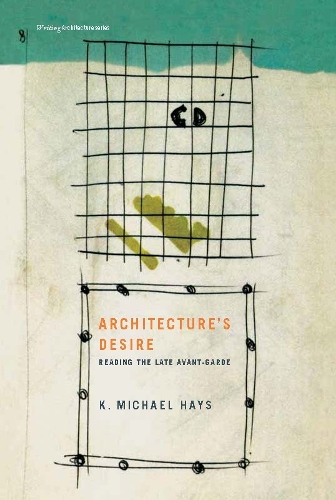
Architecture's Desire: Reading the Late Avant-Garde
(Paperback)
Publishing Details
Architecture's Desire: Reading the Late Avant-Garde
By (Author) K. Michael Hays
MIT Press Ltd
MIT Press
2nd October 2009
United States
Classifications
General
Non Fiction
724.6
Physical Properties
Paperback
216
Width 137mm, Height 203mm, Spine 13mm
340g
Description
Theorizes an architectural ethos of extreme self-reflection and finality from a Lacanian perspective.While it is widely recognized that the advanced architecture of the 1970s left a legacy of experimentation and theoretical speculation as intense as any in architecture's history, there has been no general theory of that ethos. Now, in Architecture's Desire, K. Michael Hays writes an account of the "late avant-garde" as an architecture systematically twisting back on itself, pondering its own historical status, and deliberately exploring architecture's representational possibilities right up to their absolute limits. In close readings of the brooding, melancholy silence of Aldo Rossi, the radically reductive "decompositions" and archaeologies of Peter Eisenman, the carnivalesque excesses of John Hejduk, and the "cinegrammatic" delirium of Bernard Tschumi, Hays narrates the story of architecture confronting its own boundaries with objects of ever more reflexivity, difficulty, and intransigence. The late avant-garde is the last architecture with philosophical aspirations, an architecture that could think philosophical problems through architecture rather than merely illustrate them. It takes architecture as the object of its own reflection, which in turn produces an unrelenting desire. Using the tools of critical theory together with the structure of Lacan's triad imaginary-symbolic-real, Hays constructs a theory of architectural desire that is historically specific and yet sets the terms and the challenges of all subsequent architectural practice, including today's.
Reviews
"At the very moment when the death of theory by the victorious sword of the real has been loudly proclaimed, Michael Hays' lyrical return to the 1970s when architecture first fully realized its potential to become a conceptual practice is both welcome and much needed. His close attention to key works by Hejduk, Eisenman, and Rossi uncovers striking connections between this commonly repressed substratum and the instrumental turn recently taken by architects such as Bernard Tschumi and Rem Koolhaas and persuasively turns the 'reality' of contemporary architecture upside down to reveal our new 'real' to be driven by forces more mysterious and intangible than ever."--Sylvia Lavin, Director of Critical Studies and MA/PhD Programs, UCLA Department of Architecture and Urban Design
Author Bio
K. Michael Hays is Eliot Noyes Professor of Architectural Theory at Harvard's Graduate School of Design. In 2000 he was appointed the first Adjunct Curator at the Whitney Museum for American Art. He is the author, among other books, of Modern Architecture and the Posthumanist Subject (1995) and the editor of Architecture Theory since 1968 (2000), both published by the MIT Press.
